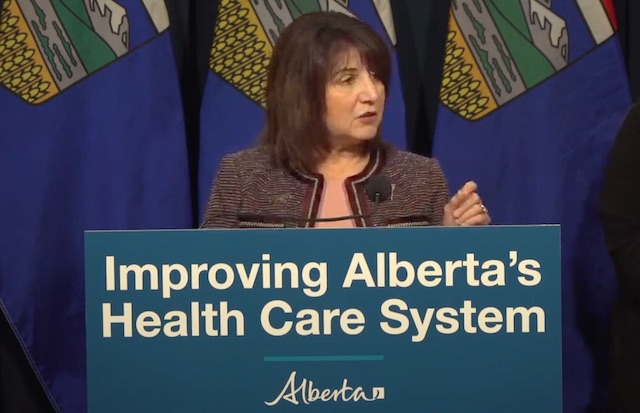Alberta
Province says improving primary health care system will take pressure off emergency care

Strengthening health care: Improving access for all
Alberta’s government is stabilizing and strengthening primary health care across the province so that everyone can access care when and where they need it.
Primary health care is the first point of contact Albertans have with the health care system, and includes health professionals such as family doctors, nurse practitioners and pharmacists.
Last fall, health care leaders, Indigenous partners and experts from across Canada and around the world came together to form advisory panels as part of the Modernizing Alberta’s Primary Health Care System (MAPS) initiative. The panels identified immediate, medium- and long-term improvements to strengthen Alberta’s primary health care system.
Alberta’s government will begin moving forward on the recommendations in the final report to improve access to primary health care for all Albertans. The recommendations will be implemented through a phased approach, with several moving forward immediately, followed by medium- and longer-term improvements that will enhance community-based primary health care across Alberta.
“Today marks an important step in the work I am undertaking to enhance primary care as the foundation of our health care system. The Modernizing Alberta’s Primary Health Care System (MAPS) reports clearly identify the challenges our system is facing, and their release signals this government’s commitment to take immediate and ongoing action to support and stabilize primary health care in our province. I look forward to the ongoing work of implementing needed changes with our health care partners and providers.”
Several immediate actions are being taken, all of which are consistent with recommendations from the panels. These actions are critical to ensuring Albertans have better access to health care when and where they need it. Alberta Health continues to work toward implementing recommendations over the medium and long term.
“The MAPS recommendations represent a huge leap forward for our primary health system – strengthening and clarifying governance, community involvement, and recognizing the importance of integrated team-based care that allows Albertans to access primary care from the most appropriate team member at the right time, in the right place. This is how we can ensure equitable access to care across our province.”
Strengthening primary health care
Alberta’s government is acting immediately on recommendations to improve primary health care and increase Albertans’ access to the medical care they need, including:
- Creating a primary health care division within Alberta Health.
- Allocating $57 million over three years to provide family doctors and nurse practitioners with support to help manage their increasing number of patients. Each provider has the potential to receive up to $10,000 annually.
- Working with the Alberta Medical Association to create a task force to recommend a new payment model for family physicians that encourages comprehensive primary care – where a patient has a regular family doctor who they develop a long-term relationship with and who works with them to ensure all their health care needs are met.
- Developing a memorandum of understanding with the Alberta Medical Association to collaborate on a transition to a new physician compensation model, modernize primary care governance and enable family doctors to spend more time with patients and less time on paperwork and immediately stabilize primary care.
- Expanding online mental health services, allowing doctors to bill for virtual mental health checks and therapy, and compensating them for extra time spent with patients virtually.
- Ensuring doctors get paid if patients can’t prove insurance coverage, reducing administrative burden. This is known as “good faith” claims.
- Introducing a payment system that will support nurse practitioners to open their own clinics, take on patients and offer services based on their scope of practice, training and expertise. Nurse practitioners have completed graduate studies ensuring that they are properly trained to examine patients, provide diagnoses and prescribe medication.
“We know that a strong primary health care system is foundational for better health care for Albertans, and that starts with access to a family physician and a team of dedicated providers. Primary care requires dedicated planning, resourcing and coordination. We are pleased to join the task force and believe continued collaboration and immediate action will bring us closer to our collective vision.”
“The Nurse Practitioner Association of Alberta is elated to see the newly released MAPs report, which provides direction for primary care reform and includes the full integration of nurse practitioners. The Government of Alberta is taking a significant and essential step in improving access to primary care for Albertans. This announcement is a win-win for Albertans and nurse practitioners, as it recognizes the valuable contributions of NPs delivering high-quality care for Albertans and their ability to decrease the stress on the health care system. We are excited about the future of primary care in Alberta.”
“These actions are welcome news for rural Alberta. Ensuring Albertans have access to health care professionals when and where they need it is essential. This work will help to solve some of the unique challenges for rural Albertans by encouraging health professions to practise in rural parts of the province.”
Strengthening Indigenous health care
Indigenous Peoples face many barriers to access appropriate health care. To support better health outcomes, the government will build more meaningful connections with Indigenous leaders and communities to identify improvements that reflect the unique nature of their communities. Immediate actions include:
- Creating an Indigenous health division within Alberta Health.
- Creating a $20-million fund for Indigenous communities to design and deliver innovative primary health care services and projects.
- Creating an Indigenous patient complaints investigator and Elders roster to investigate incidences of racism during the delivery of health care and provide culturally safe support to Indigenous patients throughout the patient complaint process.
- Investing in a community-based Indigenous patient navigator program to support Indigenous peoples throughout their health care journey.
“It is unacceptable that Indigenous Peoples continue to face so many barriers when accessing primary health care. It is crucial that all First Nations, Métis and Inuit peoples have equitable access to community-based primary health care that is culturally safe, respects their unique needs and is free of racism. These immediate actions will help us achieve that goal.”
“The panel’s recommendations provide a clear and stable pathway to create a safe, culturally appropriate primary health care system that includes Indigenous people as partners and leaders at every stage of the development, governance and delivery of health care services. The best solutions exist within our respective communities, tailored for our unique needs and priorities. The commitments made today are an important first step toward improving health equity for Indigenous Peoples, regardless of where they live in Alberta.”
Quick facts
- Advisory panels were established through MAPS in fall 2022 to identify primary health care improvements in the short term and over the next 10 years.
- Final reports from the panels were submitted in spring 2023.
- The strategic advisory panel final report contains 11 recommendations to refocus the system around primary health care with an emphasis on:
- access to team-based care
- integration between primary health care and community care
- a foundation of a coordinated and accountable primary health care system
- The Indigenous advisory panel final report contains 22 recommendations under five themes:
- improve health equity for Indigenous Peoples
- address Indigenous racism in health care
- build culturally safer primary health care and an Indigenous workforce
- create system innovation and support community capacity
- Indigenous ownership, stewardship, design and delivery of health care services
- Budget 2023 allocated $125 million over three years to implement recommendations from MAPS.
- The next step will be to further engage with health care partners, including Indigenous communities, to implement these immediate priorities and the broader MAPS recommendations.
Related information
Alberta
Alberta government’s plan will improve access to MRIs and CT scans

From the Fraser Institute
By Nadeem Esmail and Tegan Hill
The Smith government may soon allow Albertans to privately purchase diagnostic screening and testing services, prompting familiar cries from defenders of the status quo. But in reality, this change, which the government plans to propose in the legislature in the coming months, would simply give Albertans an option already available to patients in every other developed country with universal health care.
It’s important for Albertans and indeed all Canadians to understand the unique nature of our health-care system. In every one of the 30 other developed countries with universal health care, patients are free to seek care on their own terms with their own resources when the universal system is unwilling or unable to satisfy their needs. Whether to access care with shorter wait times and a more rapid return to full health, to access more personalized services or meet a personal health need, or to access new advances in medical technology. But not in Canada.
That prohibition has not served Albertans well. Despite being one of the highest-spending provinces in one of the most expensive universal health-care systems in the developed world, Albertans endure some of the longest wait times for health care and some of the worst availability of advanced diagnostic and medical technologies including MRI machines and CT scanners.
Introducing new medical technologies is a costly endeavour, which requires money and the actual equipment, but also the proficiency, knowledge and expertise to use it properly. By allowing Albertans to privately purchase diagnostic screening and testing services, the Smith government would encourage private providers to make these technologies available and develop the requisite knowledge.
Obviously, these new providers would improve access to these services for all Alberta patients—first for those willing to pay for them, and then for patients in the public system. In other words, adding providers to the health-care system expands the supply of these services, which will reduce wait times for everyone, not just those using private clinics. And relief can’t come soon enough. In Alberta, in 2024 the median wait time for a CT scan was 12 weeks and 24 weeks for an MRI.
Greater access and shorter wait times will also benefit Albertans concerned about their future health or preventative care. When these Albertans can quickly access a private provider, their appointments may lead to the early discovery of medical problems. Early detection can improve health outcomes and reduce the amount of public health-care resources these Albertans may ultimately use in the future. And that means more resources available for all other patients, to the benefit of all Albertans including those unable to access the private option.
Opponents of this approach argue that it’s a move towards two-tier health care, which will drain resources from the public system, or that this is “American-style” health care. But these arguments ignore that private alternatives benefit all patients in universal health-care systems in the rest of the developed world. For example, Switzerland, Germany, the Netherlands and Australia all have higher-performing universal systems that provide more timely care because of—not despite—the private options available to patients.
In reality, the Smith government’s plan to allow Albertans to privately purchase diagnostic screening and testing services is a small step in the right direction to reduce wait times and improve health-care access in the province. In fact, the proposal doesn’t go far enough—the government should allow Albertans to purchase physician appointments and surgeries privately, too. Hopefully the Smith government continues to reform the province’s health-care system, despite ill-informed objections, with all patients in mind.
Alberta
Canada’s heavy oil finds new fans as global demand rises

From the Canadian Energy Centre
By Will Gibson
“The refining industry wants heavy oil. We are actually in a shortage of heavy oil globally right now, and you can see that in the prices”
Once priced at a steep discount to its lighter, sweeter counterparts, Canadian oil has earned growing admiration—and market share—among new customers in Asia.
Canada’s oil exports are primarily “heavy” oil from the Alberta oil sands, compared to oil from more conventional “light” plays like the Permian Basin in the U.S.
One way to think of it is that heavy oil is thick and does not flow easily, while light oil is thin and flows freely, like fudge compared to apple juice.
“The refining industry wants heavy oil. We are actually in a shortage of heavy oil globally right now, and you can see that in the prices,” said Susan Bell, senior vice-president of downstream research with Rystad Energy.
A narrowing price gap
Alberta’s heavy oil producers generally receive a lower price than light oil producers, partly a result of different crude quality but mainly because of the cost of transportation, according to S&P Global.
The “differential” between Western Canadian Select (WCS) and West Texas Intermediate (WTI) blew out to nearly US$50 per barrel in 2018 because of pipeline bottlenecks, forcing Alberta to step in and cut production.
So far this year, the differential has narrowed to as little as US$10 per barrel, averaging around US$12, according to GLJ Petroleum Consultants.
“The differential between WCS and WTI is the narrowest I’ve seen in three decades working in the industry,” Bell said.
Trans Mountain Expansion opens the door to Asia

Oil tanker docked at the Westridge Marine Terminal in Burnaby, B.C. Photo courtesy Trans Mountain Corporation
The price boost is thanks to the Trans Mountain expansion, which opened a new gateway to Asia in May 2024 by nearly tripling the pipeline’s capacity.
This helps fill the supply void left by other major regions that export heavy oil – Venezuela and Mexico – where production is declining or unsteady.
Canadian oil exports outside the United States reached a record 525,000 barrels per day in July 2025, the latest month of data available from the Canada Energy Regulator.
China leads Asian buyers since the expansion went into service, along with Japan, Brunei and Singapore, Bloomberg reports. 
Asian refineries see opportunity in heavy oil
“What we are seeing now is a lot of refineries in the Asian market have been exposed long enough to WCS and now are comfortable with taking on regular shipments,” Bell said.
Kevin Birn, chief analyst for Canadian oil markets at S&P Global, said rising demand for heavier crude in Asia comes from refineries expanding capacity to process it and capture more value from lower-cost feedstocks.
“They’ve invested in capital improvements on the front end to convert heavier oils into more valuable refined products,” said Birn, who also heads S&P’s Center of Emissions Excellence.
Refiners in the U.S. Gulf Coast and Midwest made similar investments over the past 40 years to capitalize on supply from Latin America and the oil sands, he said.
While oil sands output has grown, supplies from Latin America have declined.
Mexico’s state oil company, Pemex, reports it produced roughly 1.6 million barrels per day in the second quarter of 2025, a steep drop from 2.3 million in 2015 and 2.6 million in 2010.
Meanwhile, Venezuela’s oil production, which was nearly 2.9 million barrels per day in 2010, was just 965,000 barrels per day this September, according to OPEC.
The case for more Canadian pipelines

Worker at an oil sands SAGD processing facility in northern Alberta. Photo courtesy Strathcona Resources
“The growth in heavy demand, and decline of other sources of heavy supply has contributed to a tighter market for heavy oil and narrower spreads,” Birn said.
Even the International Energy Agency, known for its bearish projections of future oil demand, sees rising global use of extra-heavy oil through 2050.
The chief impediments to Canada building new pipelines to meet the demand are political rather than market-based, said both Bell and Birn.
“There is absolutely a business case for a second pipeline to tidewater,” Bell said.
“The challenge is other hurdles limiting the growth in the industry, including legislation such as the tanker ban or the oil and gas emissions cap.”
A strategic choice for Canada
Because Alberta’s oil sands will continue a steady, reliable and low-cost supply of heavy oil into the future, Birn said policymakers and Canadians have options.
“Canada needs to ask itself whether to continue to expand pipeline capacity south to the United States or to access global markets itself, which would bring more competition for its products.”
-

 Censorship Industrial Complex2 days ago
Censorship Industrial Complex2 days agoHow the UK and Canada Are Leading the West’s Descent into Digital Authoritarianism
-

 Business2 days ago
Business2 days agoCapital Flight Signals No Confidence In Carney’s Agenda
-

 International2 days ago
International2 days agoThe capital of capitalism elects a socialist mayor
-

 Energy1 day ago
Energy1 day agoEby should put up, shut up, or pay up
-

 Business1 day ago
Business1 day agoPulling back the curtain on the Carney government’s first budget
-

 Daily Caller1 day ago
Daily Caller1 day agoUS Eating Canada’s Lunch While Liberals Stall – Trump Admin Announces Record-Shattering Energy Report
-

 Business1 day ago
Business1 day agoThe Liberal budget is a massive FAILURE: Former Liberal Cabinet Member Dan McTeague
-

 Business1 day ago
Business1 day agoCarney’s budget spares tax status of Canadian churches, pro-life groups after backlash









